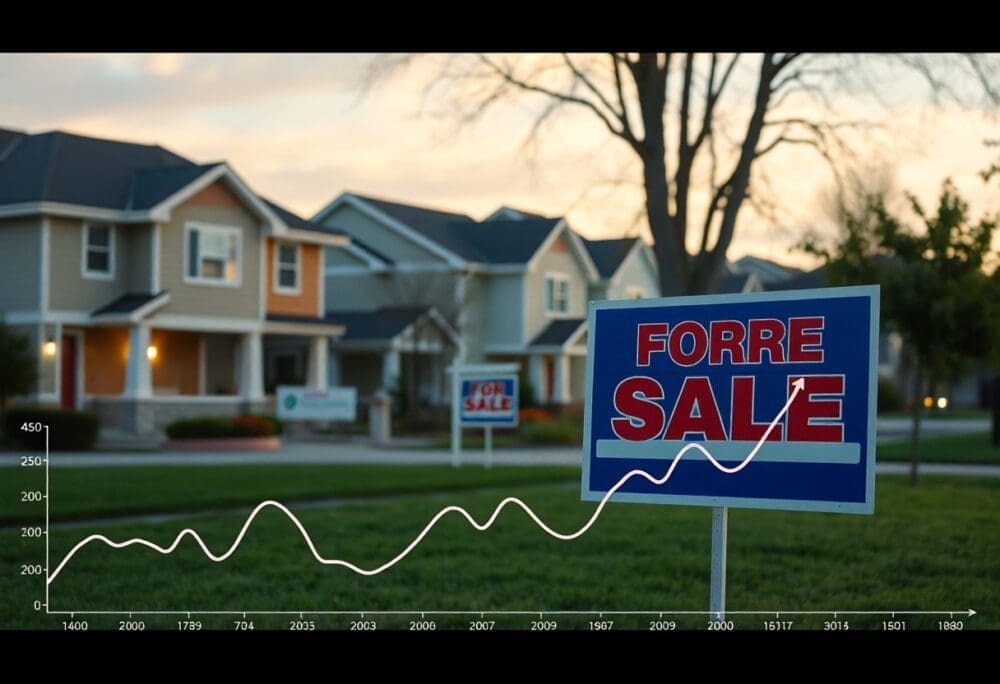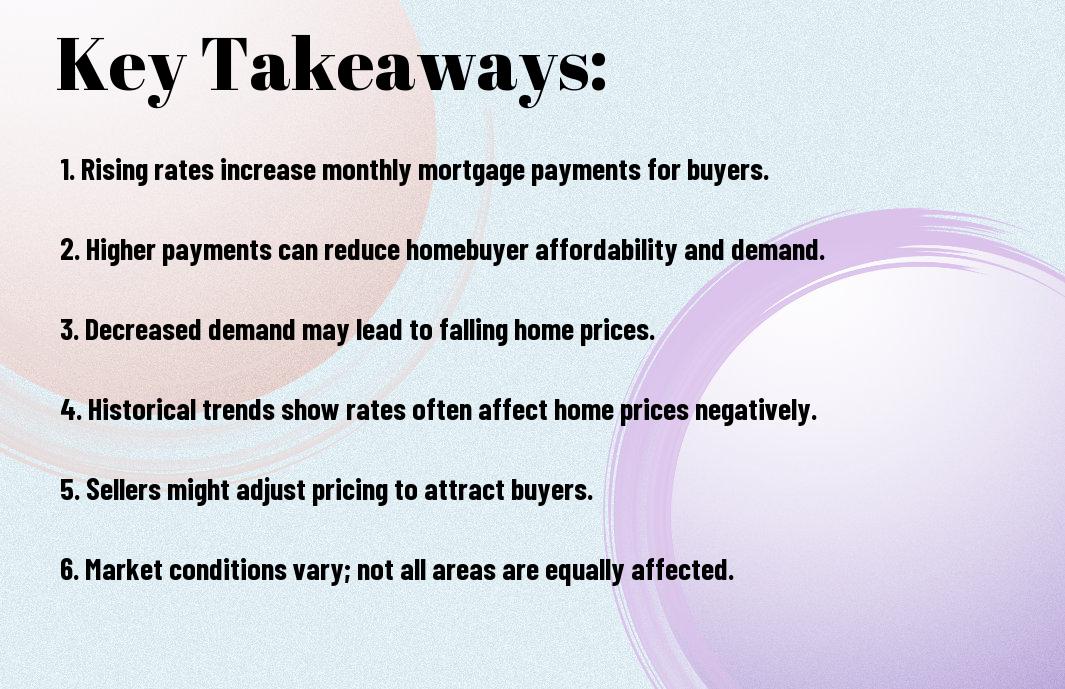With the current fluctuations in mortgage rates, you may be wondering how these changes could impact home prices in your area. As interest rates climb, potential homebuyers may feel the pinch on their budgets, which can influence demand and, consequently, property values. Understanding this relationship is key to navigating the real estate market effectively. Here, we’ll explore the potential outcomes of rising mortgage rates and what it could mean for your home buying or selling strategy.
Key Takeaways:
- Higher mortgage rates often lead to diminished purchasing power for buyers, potentially reducing demand for homes and resulting in price adjustments.
- In a competitive housing market, even slight increases in interest rates can prompt buyers to withdraw from the market, which may contribute to a cooling of home prices.
- Local market conditions and economic factors play significant roles in how rising mortgage rates will impact home prices, meaning effects can vary widely across different regions.
Understanding Mortgage Rates
The mortgage rate is the interest charged by lenders when you borrow money to purchase a home. It plays a significant role in monthly payments and overall affordability, impacting your decision-making in the housing market. Understanding how mortgage rates work can help you navigate your home-buying journey effectively.
Definition of Mortgage Rates
Above all, mortgage rates are the costs associated with borrowing money for a home loan, expressed as a percentage of the amount borrowed. A lower rate means lower monthly payments, while higher rates can significantly impact your budget.
Factors Influencing Mortgage Rate Changes
Mortgage rates are influenced by several key factors, including:
- Economic indicators (like inflation and employment rates)
- Central bank policies and regulations
- Supply and demand for housing loans
- Your credit score and financial history
Perceiving these variables can help you better anticipate changes in rates and make informed decisions about when to buy a home.
Rate changes typically reflect the larger economic environment, and staying updated with these trends is beneficial. Additionally, various elements can contribute to fluctuations, such as:
- The overall economic outlook
- Global events and market sentiment
- Housing market conditions
- Government policies and regulations
Perceiving the interconnectedness of these factors can enable you to strategize your mortgage options more effectively.
The Relationship Between Mortgage Rates and Home Prices
It is important to understand that mortgage rates and home prices often influence each other. When rates increase, borrowing costs rise, leading to potential decreases in buyer demand. Subsequently, this decline in demand can result in home prices stabilizing or even dropping. Conversely, low mortgage rates tend to spur buyer activity, driving home prices higher as more buyers enter the market, eager to take advantage of affordable financing options.
Historical Trends
Trends in the housing market have consistently shown that fluctuations in mortgage rates impact home prices. Historically, during periods of rising rates, home prices have often faced pressure. For instance, from 2000 to 2010, there were noticeable dips in home prices resulting from increased mortgage rates, emphasizing the connection between these two factors over time.
Current Market Analysis
On analyzing the current market, you will find that rising mortgage rates have started to impact home prices. With inflation concerns and tighter monetary policy, lenders are increasing rates, which might lead to a slowdown in buyer enthusiasm.
Relationship dynamics in today’s market underline a cautious approach. As mortgage rates climb higher, many prospective buyers struggle to afford homes, resulting in lower demand. With inventory levels remaining relatively stable, an increase in unsold homes may pressure sellers to reduce prices, thereby potentially leading to an overall decline in home values. Understanding this interaction is imperative as you navigate your decisions in real estate. You should stay informed of current trends to make the best financial choices possible.
Economic Impact of Rising Mortgage Rates
To understand the economic impact of rising mortgage rates, you need to consider how these changes affect the overall housing market. Higher rates can lead to reduced affordability, ultimately dampening demand for homes. As potential buyers find it harder to qualify for mortgages, this can slow down home sales, forcing sellers to adjust their expectations and potentially resulting in declining home prices.
Buyer Behavior
Mortgage rates play a significant role in shaping buyer behavior. When rates rise, you may find yourself reconsidering your budget or delaying your home purchase. This shift in perspective can lead to fewer active buyers in the market, forcing sellers to be more competitive with their pricing.
Seller Adjustments
Rising interest rates prompt sellers to reevaluate their pricing strategies. Seller flexibility becomes imperative in a market where buyer enthusiasm has waned. Adjustments may include lowering prices or enhancing property appeal to offset higher borrowing costs for potential buyers.
Seller expectations need to align with the realities of the market. If you are selling your home, be aware that as mortgage rates increase, buyers may be less willing to pay premium prices. Consider pricing your home more competitively or investing in minor renovations to attract interest. By adapting to these market dynamics, you can better position your home for a successful sale despite shifting buyer sentiments.
Regional Variations in Home Price Responses
Many factors influence how different regions respond to rising mortgage rates. Your local market dynamics, economic conditions, and population trends all play significant roles in determining whether home prices will rise, fall, or remain stable. In some areas, you might see prices soften due to affordability concerns, while in others, local demand might continue to sustain or even drive prices higher.
Urban vs. Rural Markets
By understanding the dynamics between urban and rural markets, you can gain insights into anticipated price changes. Urban markets often experience a quicker response to interest rate hikes because of their higher population density and demand for housing. Conversely, rural areas may see less volatility, as fewer buyers are impacted by changes in mortgage rates.
High-Demand Areas vs. Low-Demand Areas
Below the surface, the distinction between high-demand areas and low-demand areas is vital for grasping the future of home prices. In high-demand areas, you may find that even rising mortgage rates don’t deter buyers due to the strong local economy and limited housing supply.
Even in the face of increasing mortgage rates, high-demand areas tend to maintain resilience in home prices. Your desire to live in a desirable location, coupled with limited housing options, means that buyers are often willing to absorb higher borrowing costs. On the other hand, in low-demand areas, the impact of higher rates may be more pronounced, leading to increased price reductions as sellers compete for fewer interested buyers.
Expert Opinions on Future Market Trends
After examining various expert insights, you might find it interesting to explore How Interest Rates Affect the Housing Market. Many analysts suggest that the dynamics of mortgage rates will play a significant role in shaping the housing market’s future, influencing both buyer behavior and property values.
Optimistic Scenarios
Between rising wages and a persistent demand for housing, some experts predict that home prices may stabilize despite increasing mortgage rates. If the economy continues to grow and job security remains high, potential buyers may still be willing to enter the market, offering support to home values.
Pessimistic Outlooks
Below the surface, several indicators suggest a declining trend. If mortgage rates continue to rise, you might encounter potential buyers being priced out of the market, leading to a decrease in demand and, subsequently, home prices.
Indeed, many analysts have warned that if economic conditions deteriorate, you could see a significant slowdown in the housing market. Persistent high mortgage rates, combined with rising inflation and stagnant wages, might create a scenario where buyers hesitate, directly impacting housing demand and resulting in price declines. This could lead to a buyers’ market, where sellers need to make concessions to attract buyers.
Strategies for Buyers and Sellers in a Changing Market
For those navigating the current real estate landscape, it’s vital to adapt your strategies as mortgage rates fluctuate. Knowing how to leverage these changes can help you make informed decisions whether you are buying or selling a home.
Buying Tips
Buyers should stay well-informed about market trends and act quickly when you find a property that meets your needs. Consider these tips:
- Get pre-approved for a mortgage to understand your budget.
- Be flexible with your wishes and explore different neighborhoods.
- Negotiate terms that can help lower your initial costs.
This approach will empower you to make competitive offers without undue pressure.
Selling Strategies
Tips for sellers involve positioning your home effectively to attract buyers. Focus on presenting your property in its best light and be open to negotiation. Price your home strategically to account for changing market dynamics, while also highlighting unique features that set it apart from others. You may find that hosting open houses and engaging in online marketing can increase visibility.
Another effective strategy is to consider timing your listing based on market fluctuations. Keeping an eye on interest rates and local demand can help you choose the optimal moment to sell. Engaging a knowledgeable real estate agent can also provide you with the insights needed to navigate these changes successfully and maximize your selling potential. Additionally, ensuring your home is in excellent condition before listing can make a significant difference in attracting potential buyers.
Conclusion
Now that you understand how rising mortgage rates can influence home prices, it’s clear that higher borrowing costs often lead to reduced buyer demand. As affordability declines, sellers may need to lower their asking prices to attract potential buyers. This scenario can create opportunities for you, whether you’re looking to buy or invest in real estate. Staying informed about market trends will help you navigate these changing conditions effectively and make the best decisions for your financial future.
Q: How do rising mortgage rates impact home affordability?
A: Rising mortgage rates generally increase the cost of borrowing, which can lead to higher monthly mortgage payments for buyers. This rise in monthly expenses may reduce the number of potential buyers in the market, as some may no longer qualify for loans or find the payments too steep. As demand decreases due to affordability concerns, it could put downward pressure on home prices, especially if sellers are unable or unwilling to lower their asking prices to attract buyers.
Q: Is there historical evidence of a connection between mortgage rates and home prices?
A: Yes, historical data often shows a correlation between mortgage rates and home prices. For example, during periods when mortgage rates have risen significantly, there has typically been a corresponding cooling in the housing market, leading to price stabilization or declines in some areas. However, it’s important to note that while rising rates can influence home prices, they are just one of many factors that affect the real estate market, including local economic conditions, housing supply, and buyer sentiment.
Q: What factors can mitigate the impact of rising mortgage rates on home prices?
A: Several factors can mitigate the potential drop in home prices despite rising mortgage rates. First, a strong job market and rising wages can offset higher borrowing costs, allowing buyers to maintain their purchasing power. Second, limited housing supply can sustain prices as competition among buyers remains strong, even against the backdrop of higher mortgage rates. Lastly, if potential homebuyers expect continued appreciation in home values or fear missing out on homeownership, they may be more inclined to purchase despite the cost of financing, thereby stabilizing home prices.







